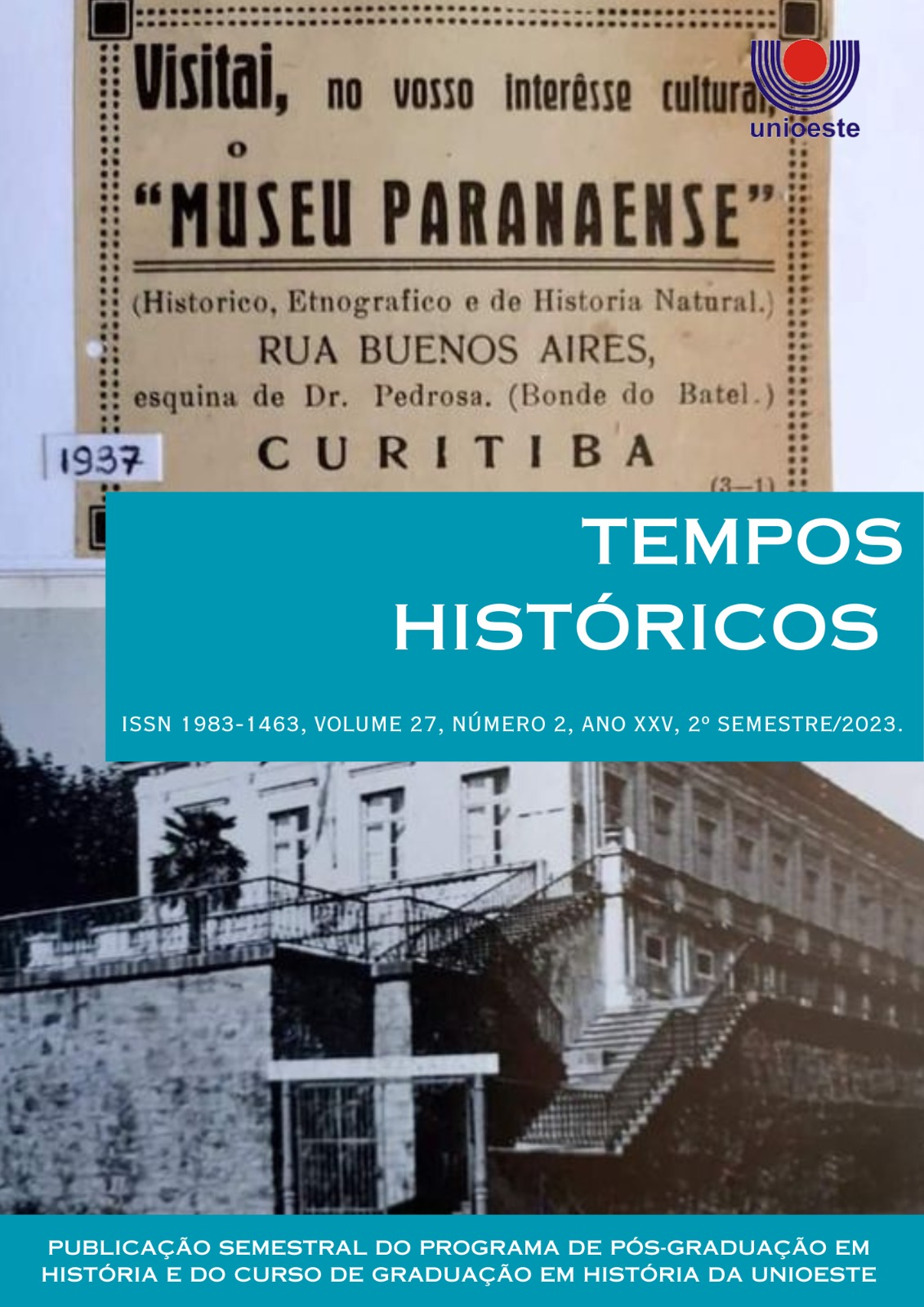O ensino da história ruandesa após o genocídio de 1994: a narrativa histórica do governo de Ruanda e o autoritarismo da Frente Patriótica Ruandesa (RPF)
DOI:
https://doi.org/10.36449/rth.v27i2.31176Keywords:
Ruanda, Ensino de História, AutoritarismoAbstract
O presente artigo faz parte de uma pesquisa ampliada que tem como principal objeto o governo de Ruanda após o genocídio de 1994. Neste momento, busca-se analisar o modo que o governo ruandês orienta o ensino da história recente de Ruanda. Tal proposição ensino da história opera de modo a dar mais visibilidade à alguns conteúdos substantivos, e esconder outras informações acerca do passado ruandês. Para tal, analisamos como fontes alguns materiais produzidos pelo governo ruandês e pelo seu Ministério da Educação, principalmente o guia para professores de história, que é fundamental para a difusão da história ruandesa nas escolas e para a população local como um todo. A escolha e valorização de determinados episódios e sujeitos históricos, assim como o apagamento e silenciamento de outros podem nos demonstrar como o controle e o ensino da história são importantes para a consolidação de projetos políticos autoritários.
References
AMNESTY INTERNATIONAL, Rwanda’s repressive tactics silence dissent before elections, 2017, in: https://www.amnesty.org/en/latest/campaigns/2017/08/rwandas-repressive-tactics-silence-dissent-before-elections/
ANSOMS, A. Rwanda’s Post-Genocide Economic Reconstruction. The Mismatch between Elite Ambitions and Rural Realities. In S. STRAUS, S., WALDORF, L. (eds), Remaking Rwanda. State Building and Human Rights after Mass Violence. Madison: The University of Wisconsin Press, 240–51.
ANSOMS, An, MARIJNEN E. CIOFFO, J. MURISON, J. Statistics versus livelihoods: questioning Rwanda´s pathway out of poverty. Review of African Political Economy, vol 44, nº 151, pp. 47-65, 2017.
ANSOMS, An. Re-engineering rural society: the visions and ambitions of the Rwandan elite. African Affairs, 108/431, Oxford, Oxford university press, pp. 289-309, 2009.
BADI, M. La globalización neoliberal: las alternativas africanas. Buenos Aires, Revista Theomai, n 17, p. 77-87, 2008.
BITTENCOURT, Circe. Ensino de história: fundamentos e métodos. São Paulo: Cortez, 2004.
BLAIR, T., BUFFET, H. Stand with Rwandans. Now is no time to cut aid to Kigali. Foreign Policy, February 21. 2013
CLARK, P. The Gacaca Courts, Post-Genocide Justice and Reconciliation in Rwanda. Justice without Lawyers. London: Cambridge University Press, 2010.
CRISAFULLI, Patricia, REDMOND, Andrea. Rwanda, Inc.: how a devastated nation became an economic model for the developing world. Nova Iorque, Palgrave Macmillan, 2012.
FONSECA, Danilo F. Colonialismo em Ruanda: entre a exploração e a valorização (1918 – 1962). Revista de História da UEG. , v.5, p.199 - 218, 2016
FONSECA, Danilo Ferreira da. A mídia ruandesa no genocídio de 1994: a relação entre tutsis, Inkotanyis e a Frente Patriótica Ruandesa. Em Tempo de Histórias, v. 22, p. 56-77, 2013.
GOUREVITCH, P. The Life After. Fifteen years after the genocide in Rwanda, the reconciliation defies expectations. The New Yorker, maio 4: 35–50, 2009.
KINNIBURGH, Colin. Beyond "Conflict Minerals": The Congo's Resource Curse Lives On. Dissent, v. 61, n. 2, p. 61-68, 2014.
MAMDANI, Mahmood. When victims become killers: colonialism, nativism and the genocide in Rwanda, Princeton, Princeton University Press, 2002.
MUTABEZI, Eric. Identity and citizenship in Rwanda: analysis of history textbooks Bildungsforschung, S. 2021, p. 1-13.
RWANDA BASIC EDUCATION BOARD, History S6 – Teacher Guide, Kigali, 2020.
STRAUS, S., WALDORF, L. (eds) Remaking Rwanda. State Building and Human Rights after Mass Violence. Madison: The University of Wisconsin Press, 2011.
STRAUS, Scott. The order of the genocide: race, power, and war in Rwanda. Ithaca, Cornell University Press, 2006.
SUNDBERG, Molly. Training for Model Citizenship: An Ethnography of Civic Education and State-Making in Rwanda. Upsalla, Palgrave Macmillan US, 2016.
TWAGIRAMUNGU, Noel. Embracing Neo-liberalism in Uganda and Rwanda. In: LAHAI, J., LYONS, T. (org,) African Frontiers: Insurgency, Governance and Peacebuilding in post- Colonial States. New York: Routledge, 2015.
UWIZEYUMANA, Dominique. Aspects and Consequences of the Rwandan Law of Genocide Ideology: A Comparative Analysis. Mediterranean Journal of Social Sciences, MCSER Publishing, Rome-Italy, Vol 5, No 23, p. 2370 – 2379, 2014.
WORLD BANK, World Bank Development Indicators, 2015 in: databank.worldbank.org
Downloads
Published
How to Cite
Issue
Section
License

This work is licensed under a Creative Commons Attribution-NonCommercial-ShareAlike 4.0 International License.
Aviso de Direito Autoral Creative Commons
Política para Periódicos de Acesso Livre
Autores que publicam nesta revista concordam com os seguintes termos:
1. Autores mantém os direitos autorais e concedem à revista o direito de primeira publicação, com o trabalho simultaneamente licenciado sob a Licença Creative Commons Attribution que permite o compartilhamento do trabalho com reconhecimento da autoria e publicação inicial nesta revista.2. Autores têm autorização para assumir contratos adicionais separadamente, para distribuição não-exclusiva da versão do trabalho publicada nesta revista (ex.: publicar em repositório institucional ou como capítulo de livro), com reconhecimento de autoria e publicação inicial nesta revista.
3. Autores têm permissão e são estimulados a publicar e distribuir seu trabalho online (ex.: em repositórios institucionais ou na sua página pessoal) a qualquer ponto antes ou durante o processo editorial, já que isso pode gerar alterações produtivas, bem como aumentar o impacto e a citação do trabalho publicado (Veja O Efeito do Acesso Livre).
Licença Creative Commons
Esta obra está licenciada com uma Licença Creative Commons Atribuição-NãoComercial-CompartilhaIgual 4.0 Internacional, o que permite compartilhar, copiar, distribuir, exibir, reproduzir, a totalidade ou partes desde que não tenha objetivo comercial e sejam citados os autores e a fonte.


